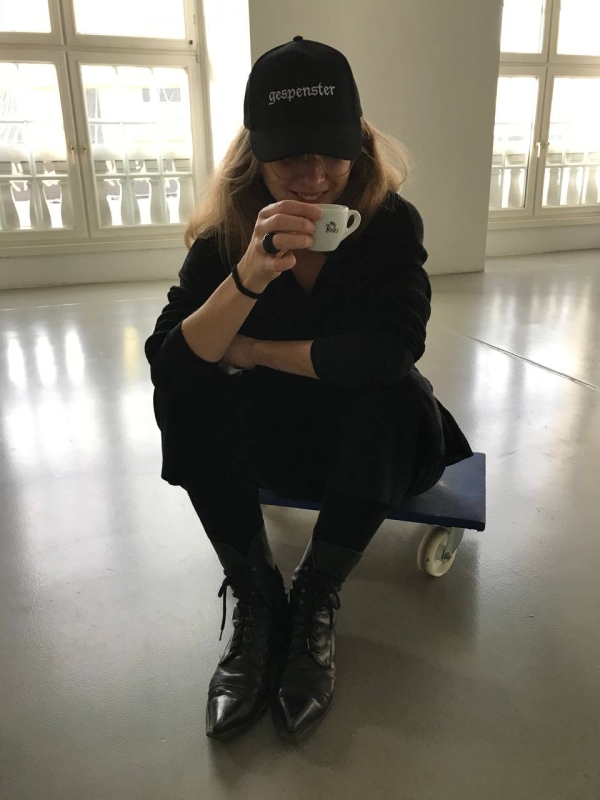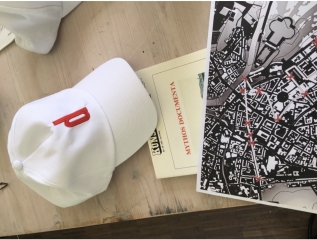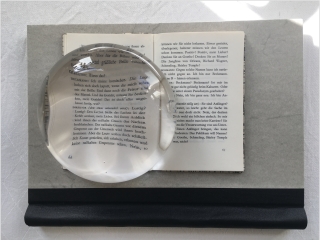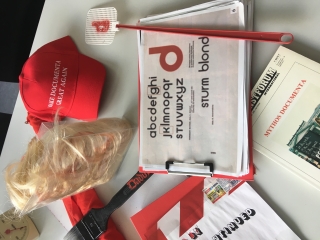d steht für …? documenta zwischen Denazifizierung und Dekolonisierung
Gastvortrag Nanne Buurman
Kunstgeschichte
Eines
der Ziele der ersten documenta im Jahr 1955, dem Jahr der Unabhängigkeit der Bundesrepublik Deutschland, war die Rehabilitierung
der modernen Kunst, die von den Nazis in den Ausstellungen der sogenannten entarteten Kunst verfemt worden war. Während die
documenta daher lange als Ausdruck von Denazifizierung und Demokratisierung wahrgenommen wurde, deren Macher* einen radikalen
Bruch mit der nationalsozialistischen Vergangenheit vollzogen, wird Nanne Buurman in ihrem Vortrag darauf eingehen, wie die
Ausstellungsreihe nicht nur als „Waffe im Kalten Krieg“ diente, sondern auch von einigen ihrer Gründerväter zum Weißwaschen
der deutschen Kunst/Geschichte eingesetzt wurde, einschließlich ihrer Rollen innerhalb der Kulturpolitik des „Dritten Reiches“.
Indem sie die sozial reproduktiven (und reparativen) Funktionen der documenta als kulturelle Heilanstalt
westdeutscher Identitäten in den Blick rückt, wird Buurman erörtern, wie die Institution einen Rahmen bot, in dem völkisch-nationalistische
Ideen, Konzepte und Formen für neue politische Zwecke recycelt, gereinigt und resignifiziert werden konnten. Auf der Grundlage
ihrer künstlerischen, kuratorischen und wissenschaftlichen Forschungen zu documenta as a Hauted House wird der Vortrag einige
der untoten Geister des Nationalismus und Kolonialismus in den Blick nehmen, die das „100-Tage-Museum“ seit der Nachkriegszeit
immer wieder heimsuchten, um über das politisch ambivalente Erbe der Moderne und sein un/heimliches Fortleben in epistemologischen,
ökonomischen und kulturellen Infrastrukturen bis heute nachzudenken.
Heal the World, or: documenta as a
Haunted House
In their first statement after being nominated as artistic directors of documenta 15 in 2019,
ruangrupa announced that “if documenta was launched in 1955 to heal war wounds, why shouldn’t we focus on today’s injuries,
especially the ones rooted in colonialism, capitalism, or patriarchal structures”, thereby invoking the idea of the exhibition
as a nurse tending to the wounds inflicted by the respective dominant system. With a focus on the etymological links between
curating and curing, the notion of healing has become even more pervasive in artistic and curatorial discourse since the pandemic.
Starting from a heuristic model of exhibitions as households with specific gendered divisions of labour and distributions
of power, I would like to complicate the notion of healing by calling attention to its ambivalent histories within and beyond
documenta. By looking at the socially re/productive dimensions of curating, the presentation aims to undo all too comfortable
understandings of curating/care as purely good things also shedding light on the dark side of the cura and its governmentalities.
The presentation thus deals with documenta as a haunted house – haunted, as it is, by the undead spirits of the past that
don’t just live on between the pages of history books and behind the walls of exhibitions but also inhabit our bodies and
minds, thus affecting cultural infrastructures more broadly.
documenta as a Haunted House
One
of the first documenta’s aims in 1955, the year of the Federal Republic of Germany’s independence, was to rehabilitate the
modern art that had been ostracized by the Nazis in the exhibitions of so-called degenerate art. While documenta has therefore
generally been perceived as an arbiter of democracy, whose makers were performing a radical break with the Nazi past, in her
talk Nanne Buurman will address the ways in which the exhibition not only served as a ‘Weapon in the Cold War’ but was also
deployed by some of its founders as means of whitewashing German (art) history, including their own roles within ‘Third Reich’
cultural politics. Focusing on documenta’s socially reproductive (or even reparative) functions as a cultural midwife of West
German identity, she will discuss how the institution provided a framework in which völkisch-nationalist ideas, concepts,
and forms could be recycled, cleansed and resignified for new political uses. Drawing on her recent research and practice
, the talk will thus unearth some of the undead spirits of the past that were haunting the “100 day Museum” during documenta’s
postwar editions to reflect on the politically ambivalent heritage of modernity and its uncanny hauntings until today.
Nanne Buurman forscht, lehrt und publiziert zu kuratorischen Praktiken, Gender, Arbeit und Globalisierung
im Feld der zeitgenössischen Kunst, zur Geschichte und Gegenwart der documenta und zu NS-Kontinuitäten in Kunst und Kultur.
Als wissenschaftliche Mitarbeiterin für documenta- und Ausstellungsstudien war sie 2018–2020 am Aufbau des documenta-Instituts
sowie an der Gründung des Transdisziplinären Forschungszentrums für Ausstellungstudien TRACES beteiligt. 2020-2022 ko-leitete
sie die dis_continuities Gruppe zur künstlerischen und wissenschaftlichen Erforschung von NS-Kontinuitäten bei der documenta.
Sie war Promotionsstipendiatin im Internationalen Graduiertenkolleg InterArt an der Freien Universität Berlin, Gastwissenschaftlerin
am Goldsmith College in London und hatte Lehraufträge in Leipzig, Hildesheim, Bremen und Frankfurt/Main inne. Darüber hinaus
war sie an zahlreichen Kunstvermittlungs-, Ausstellungs- und Publikationsprojekten beteiligt, darunter beispielsweise das
von ihr im Rahmen der documenta 12 Kunstvermittlung initiierte Projekt Arbeitslose als Avantgarde (2007), das kuratorische
Forschungsprojekt in freiheit dressiert. being natural is simply a pose (2019), das Networks of Care-Programm in der nGbK
Berlin (2021), die Ausstellung wir alle sind gespenster: haunting infrastructures im Kunstverein Kassel (2021) und das Projekt
g/hosting the past im Rahmen der documenta fifteen (2022). Sie ist Mitherausgeberin der Bände documenta. Curating the History
of the Present (2017, mit Dorothee Richter), Situating Global Art. Temporalities – Topologies – Trajectories (2018, mit Sarah
Dornhof, Birgit Hopfner, Barbara Lutz ) sowie Networks of Care. Politiken des (Er)haltens und (Ent)sorgens (2022, mit Anna
Schäffler und Friderike Schäfer). Sie ist Mitgründerin der Webplattform documenta studien (mit Nora Sternfeld, Carina Herring,
Ina Wudtke).
Nanne Buurman is an author, editor, curator and educator based in Leipzig. As a researcher
and lecturer for documenta and exhibition studies at the Kunsthochschule Kassel, she was part of the team building the documenta
Institut (2018-2020). In that capacity, she was also involved in founding the University of Kassel’s Transdisciplinary Research
Center for Exhibition Studies TRACES. 2020-2022 she was co-head of the dis_continuities research group on Nazi continuities
at documenta. After graduating from Leipzig University, she was a member of the International Research Training Group InterArt
at the Freie Universität Berlin and a visiting scholar at Goldsmiths College in London, supported by a DFG scholarship for
her doctoral research on the gendered economies of curating. Furthermore, Buurman worked as an adjunct lecturer at universities/art
academies in Leipzig, Hildesheim, Bremen, Frankfurt (Main), and has been involved in numerous art education, exhibition, and
publication projects, such as the curatorial research project in freiheit dressiert. being natural is simply a pose (Kassel/Leipzig
2019), the Networks of Care program (nGbK Berlin 2021), the experimental exhibition wir alle sind gespenster: haunting infrastructures
(Kunstverein Kassel 2021) and the g/hosting the past project at documenta fifteen (2022). Her research and publications focus
on museum- and exhibition studies, the politics, economies and epistemologies of curating, the past and present of documenta,
the shifting roles of race, class and gender in artistic and curatorial practice, the transcultural conditions of cultural
production in a global context as well as the political ambivalences of modernity and their uncanny hauntings today. She co-edited
documenta: Curating the History of the Present (with Dorothee Richter, 2017), Situating Global Art: Temporalities – Topologies
– Trajectories (with Sarah Dornhof, Birgit Hopfener and Barbara Lutz, 2018), and Networks of Care. Politics of Preserving
and Discarding (with Anna Schäffler and Friderike Schäfer, 2022). She serves as an editor of the research platform documenta
studies, which she co-founded with Nora Sternfeld, Carina Herring, and Ina Wudtke in 2018.







